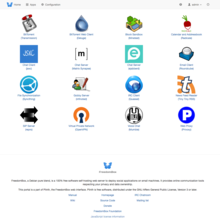FreedomBox for Communities/Introduction to FreedomBox

FreedomBox is a ready made personal server, designed with privacy and data ownership in mind. It is a subset of the Debian universal operating system and includes free software only. You can run it on a small, inexpensive and power-efficient computer box in your home that is dedicated for that use. It can also be installed on any computer running Debian or in a virtual machine.
In order to replace third-party communication services that are data mining your entire life, you will be able to host services yourself and use them at home or over the Internet through a browser or specialized apps. These services include chat and voice calls, webmail, file sharing and calendar, address book and news feed synchronization. For example, to start using a private chat service, activate the service from the administration interface and add your friends as authorized users of the service. They will be able to connect to the service hosted on your FreedomBox, using XMPP chat clients such as Conversations on Android, Pidgin on Windows and Linux, or Messages on Mac OS, for encrypted communications. FreedomBox can also host a Wi-Fi access point, ad blocking proxy and a virtual private network (VPN). More advanced users can replace their router with a FreedomBox.
To set up FreedomBox at home on a specific hardware or on your computer running Debian may require a bit of technical expertise or help from the community. Once installed the interface is easy to use, similar to a smart phone.
For Communities
[edit | edit source]The primary design goal of FreedomBox is to be used as a personal server at home for use by a single family and their friends. However, at the core, it is a server software that can aid a non-technical user to setup services and maintain them with ease. Security is automatically managed and many of the technical choices in system administration are taken care by the software automatically thereby reducing complexity for a non-technical user. This nature of FreedomBox makes it well-suited for hosting services for small communities like those described here. Communities can host their own services using FreedomBox with minimal effort. They can setup Wi-Fi networks that span the entire area of the community and draw Internet connections from long distances. Community members can enjoy previously unavailable Internet connectivity, ubiquitous Wi-Fi coverage, free VOIP services, offline education and entertainment content, etc. This will also boost privacy for individuals in the community, reduce dependence on centralized services provided by large companies and make them resistant to censorship.
When used to serve a sizable community, it is recommended that full size desktop computers act as FreedomBox servers rather than typical single board computers, as they have performance and reliability advantages. For example, the authors have found that an old desktop computer can serve well for a small village.